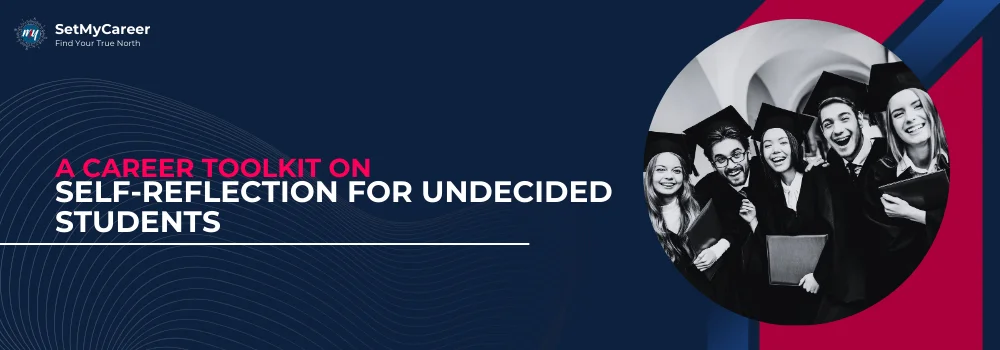Published by Jyothi Patil on 22 January 2024
Content Strategist | Editorial Team Member
Jyothi Patil is a skilled writer with a strong background in English literature, which she applies to crafting engaging content across various platforms. From writing blogs for her website and guest posts to creating pieces on Medium and Substack, Jyothi excels in making complex ideas easy to understand.
Undecided about your future? This self-reflection career toolkit helps you align your passions with a rewarding career path.

Imagine waking up every morning energized about the coming workday, tackling challenges with zeal, and feeling truly satisfied at the end of each day. For most, this scenario seems unrealistic or reserved only for the lucky few who land dream jobs.
However, by identifying your real passions and skills and aligning your career choices accordingly, you can turn this vision into reality. Don’t believe us? Read on.
An HBR study revealed that only 20% of adults reported feeling passionate about their jobs. The remaining 80% drudged through each week simply working for weekends and paychecks. This widespread lack of engagement results in trillions of lost productivity every year.
Deciding on a career path is one of the most critical choices students have to make, yet many feel they need clarification on what truly inspires them. Identifying your passions and skills can clarify your professional aspirations.
This guide offers a practical toolkit to aid in self-reflection to help undecided students discover rewarding career paths aligned with their passions.
Choosing a career solely based on potential income rather than interest often leads to lackluster performance and dissatisfaction. In contrast, workers who feel genuinely passionate about their occupations tend to thrive.
Possessing a passion for your career provides benefits beyond happiness. Those pursuing work they genuinely enjoy also tend to excel, presenting advantages for both employees and employers.
Think of a student who adores helping struggling readers. Once all grown up, she becomes an elementary teacher and pours passion into lesson planning and coaching students after school.
Consequently, her students’ literacy rates triple the district average due to her inspirational teaching fueled purely by love for the role. Alternatively, another student picks a career based solely on income potential and aims just high enough to get by in a job lacking meaning.
Over decades, these diverging professional paths would understandably impact personal fulfillment and contributions to the world differently.
Stories like these demonstrate why harmonizing your work and passions matters; not just for your joy but also for cultivating your highest potential.

Your future is clearer when you know yourself.
Find Your ToolkitWhen determining which career paths might allow you to convert a passion into a profession, consider the following elements:
By objectively assessing these aspects of yourself, you can narrow down fulfilling career options.
Your passions may be uncovered through hobbies, childhood dreams, innate skills, or academic interests. Reflect thoroughly and track patterns regarding activities that absorb your focus. Observe what energizes you and makes time fly by. Also, examine when you feel fully confident and satisfied. These clues can illuminate the best professional direction.
The following steps form a toolkit to guide you through structured self-examination to pinpoint your passions:
Document activities, subjects, and skills that absorb your focus or bring contentment through writing, photography or video. Recording memorable moments when you lose yourself fully immersed while doing something you enjoy captures clues about ideal vocational paths. Be on the lookout for passions that might materialize during academics, hobbies, conversations, or random daily observations.
Note talents that come easily like coding, public speaking, project management, playing instruments or anything drawing praise from others. These innate abilities that energize you can translate directly into career options where you will thrive and stand apart from your peers. You can also take online assessment quizzes to reveal latent strengths. Don’t shy away from flaunting your passion – motivation or the learnings – either way, it’s a win.
Assess what environments and work formats appeal to you or drain you such as remote roles, team collaborations, independent projects or fieldwork opportunities. Connecting preferences to potential job traits builds a profile summarizing compatible positions tailored to who you are. If you wish to get a closer and deeper look at your inner personality and your work personality, check out SetMyCareer’s Psychometric Career Test.
Using passion clues, strength profiles and personality compatibility, search online for matching vocations. For example, if cooking, the sciences, and managing projects energize you, explore roles like research chef, nutrition scientist or culinary project manager. Discover education paths for these latest career possibilities. Use resources like Occupational Information Network (O*NET) tools to find careers matching your traits and skills.
Get firsthand exposure through job shadowing, mentors and classes in areas showing promise to gauge fit. Seek internships allowing hands-on experience and conversations with field veterans to finalize directions before committing through training or college majors. Email people working in fields of interest asking for informational interviews to learn about their roles. By testing options aligned with your authentic makeup, final career selections become clear.
By following these steps, you will gain clarity about how to transform your authentic passions into satisfying career paths.
As part of your journey toward career clarity, continuously revisit these reflective questions:
Keep an ongoing list of self-discoveries from regularly revisiting these prompts. Over time, certain patterns should emerge pointing toward promising professional pursuits.
By devoting time to intentional self-examination of your skills and passions using the techniques provided, undecided students can determine fulfilling Career Choice. This introspective process liberates you to pursue paths not for status or money but for the joy found when dedication intersects with purpose.
Your career belongs uniquely to you rather than traditional expectations. Allow your authentic self to guide your decisions toward previously unimagined yet satisfying destinations. You hold the ability to convert your true passions into dynamic, meaningful professions that energize you.
No. 14/595, 1st Floor, Nanjappa Reddy Layout, Koramangala 8th Block, Bangalore 560095